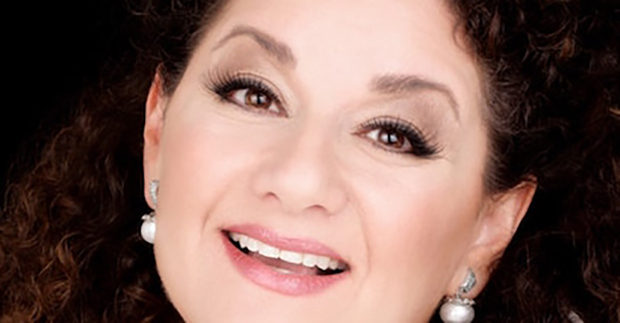Interview: Sharon Azrieli Finds Joy and Comfort in Music
Azrieli talks about her latest albums and the Azrieli Music Prizes.
Sharon Azrieli is a multi-hyphenate: singer, Synagogue Cantor, and philanthropist, among many other monikers. Through her family's foundation, fulfilling the philanthropic legacy of her late father, Canadian real estate magnate David Azrieli, the performer helps administer the Azrieli Music Prizes, celebrating excellence in composition. Here, she tells us about them, as well as her new albums featuring the songs of Frank Wildhorn and Michel Legrand.

(image provided by LSG Public Relations)
You've had two albums come out during the pandemic times: one devoted to Frank Wildhorn and the other to Michel Legrand. Tell me about putting them together.
Michel Legrand I started in the heart of Covid, and Frank I started to work on at least two years before that. Frank is the kindest, most patient man, and he's also extremely busy. But he found time to work with me. He said to me "Why do you want to make this album?" And I was like "Frank, I don't know. I want to leave a legacy." And I do. Some people want to paint paintings, some people want to write books. I feel like this is my legacy. He started to work with me, and it was a discovery, for me, of how to sing in the Broadway style.
How so?
I spent 25 years singing opera, and, in my Broadway album, which came out before my Frank album, you can hear a weaning away from opera. Everything is gradual and everything takes time to learn. Frank is an amazing teacher: more breath here, less voice there, more breath there. It takes a while to change the technique of 25 years.
Tell me about picking the songs you chose for your Wildhorn and Legrand albums, since they have so many to choose from.
We would meet in New York every few months for a few intense days, and he would play me, like, six or eight songs, and I'd have to choose two or three. Then we would have to figure out the key, and then I would have to translate them. I translated nine songs into French, two into Italian, one into Hebrew, and two of them we decided to leave in English. The Michel Legrand album is a similar deep dive: these are writers who have so many songs to choose from. I looked at who else had recorded them, the meaning behind them. I guess I get that from opera. You always have to know the backstory for the character.
Do you see differences between singing Broadway or opera and Jewish liturgical music?
That's a hard question and it has several parts. When you're a Cantor in a synagogue, your interactions with people are immediate. You feel the love back and forth. Opera is a cardiovascular sprint, and it's also a young person's sport. You know when you're a certain age and you have no fear of breaking any bones? You just jump into the wild? That's opera. And it makes you cry. It's so beautiful. So can Broadway. Broadway is acting through music, and it's a complete art.
Tell me about your music prize and how it got started.
My dad founded this foundation, and I'm the family member who is championing art and music. I had to convince the people in the foundation to give to music and art. But how do you do that? I looked at what kinds of prizes exist. We're a Jewish family; my father was a survivor of the Holocaust. So, the first prize we created was for an existing work of Jewish music, and the second was for a new composition of Jewish music. What is Jewish music? It can be a biblical story, have the cantorial modes in it, or it could be in Hebrew or Aramaic or Yiddish. There are a lot of elements to it, but it's definable, and it's open to anybody around the world.
The next prize we called the Canadian Music Prize, and you have to be Canadian. The prize winner was someone of mixed heritage; her father was Japanese and in a Canadian internment camp during the second World War. Finally, we're about to announce the last prize, which is for international music, which will also be open to anybody from anywhere. The rules are on the website with how to apply.
I don't meant to sound cavalier, but it's easy to raise money for things like medicine, right? But the arts and humanities are always the poor sister. Music develops your brain, your heart, your soul, but it's left out of the curriculums. It's so important.








